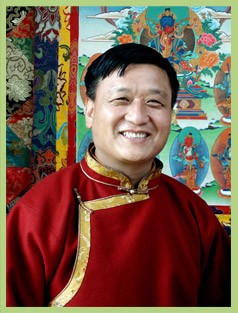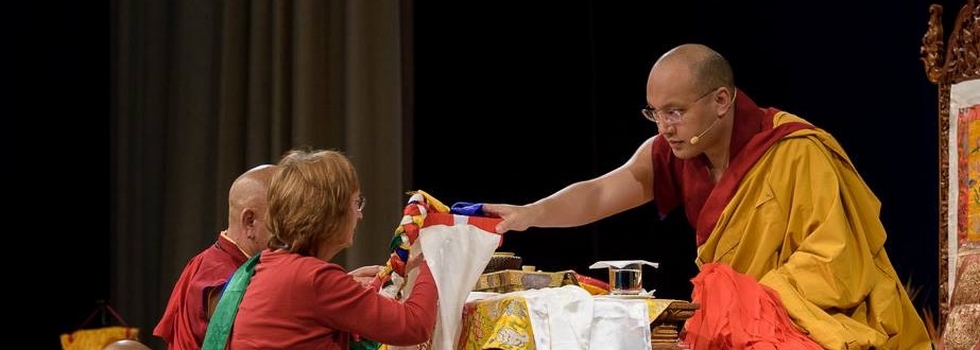
Geshe Tenzin Wangyal Rinpoche
Venerable Geshe Tenzin Wangyal Rinpoche was born in Amritsar, India, after his parents had to flee from their homeland. Since the age of 13, he has studied and practiced with important masters of both Bon and Buddhist Lineages. He attained the Tibetan doctorate degree of Geshe in 1986. Upon graduation, H.H. the Dalai Lama asked him to work at the Library of Tibetan Works and Archives in Dharamsala. He was awarded a Rockefeller Fellowship from 1991-92 to teach at Rice University in Houston, Texas. From 1994-95 he was awarded a grant from the National Endowment for the Humanities to conduct research on the logical and philosophical aspects of the Bon Tradition. Rinpoche is author of Wonders of the Natural Mind, The Tibetan Yoga of Dream and Sleep, Healing with Form, Energy and Light, and Unbounded Wholeness, all of which are based upon the Zhang-Zhung-Nyan-rGyud.1 He resides in Charlottesville, Va., where he established the Ligmincha Institute for the preservation of the religious and cultural heritage of Tibet. He travels extensively and has established centres in Europe, the U.S., and Canada.
Dream Yoga - An Introduction
Every single sentient being dreams while asleep. Regardless of whether one is rich, poor, stupid, sad, or a yogi, everybody dreams. When one goes to sleep, one dreams. One spends a third of one's lifetime sleeping. On an average, everybody sleeps 25 to 30 years. Ever since ancient times and up and until now, especially the Ma-rGyud, the "Mother Tantra" of the
1 In an interview in 2006 (available online), Tenzin Wangyal Rinpoche tells us that the Zhang-Zhung-Nyan-rGyud is the oral transmission consisting of nine stages of the Great Completeness, Bon Dzogchen (see note 3), and focuses strongly on experiential aspects of practice.
Zhang-Zhung is the name of the kingdom that existed before the king in Central Tibet became so powerful in the 8th century that the ancient centres of worship and the lives of many people were lost. Before then, the kingdom extended from north-western Tibet, through parts of Nepal, Ladakh, Zanskar, Kinnaur, Spiti, throughout Afghanistan and Persia, and in the east to the borders of China. Gangchen Tise, i.e., Mt. Kailash, was the centre of Zhang-Zhung, the kingdom that no longer exists. Most teachings of Bon, the native religion of Tibet, were translated from Zhang-Zhung into Tibetan. Some of the outstanding scholars of that time were Vairocana and Drenpa Namkha, who tried to combine the older tradition of Bon with the teachings of Buddhism from India. But when the king learned about these translation activities, Vairocana was severely punished and banished to the remote area of Tsawa-Rong in East Tibet.
Tibetan Bon Tradition,2 urges us not to waste the time we spend sleeping and teaches us to appreciate the importance of discovering the quality of night-work.
Is there a particular reason why we think? I think that the reason why we think is the same reason why we dream. The ability to think and dream somehow shows that there are deeper expressions in ourselves that we do not necessarily experience in our conscious mind. In our waking, intellectual mind, differences dominate and determine how we experience ourselves. Whereas while asleep, the waking, active and conscious mind dissolves into the basic consciousness, kun-gzhi-rnam-par-shes-pa in Tibetan (alaya-vijnana in Sanskrit). The basic, all-ground consciousness stores one's deeper karmic traces, too, which are a part of oneself. When stirred and awakened, the karmic traces tell stories and convey messages. People who don't know about these teachings read very fast. For instance, they tell me, "Oh, your book was so nice. I read it last weekend." This always surprises me and I ask them, "So, you think you understand?" That's not the way. I used to write down the verses of sacred texts, kept them in my pocket, sat somewhere, read, and reflected what each line really means experientially.
Every individual, every ordinary person has the ability to work on his or her own limitations. First, one needs to notice what kind of dreams one has while one is asleep and what kind of blockages present obstacles in one's life before embarking on a higher spiritual path, i.e., one needs to have a fertile ground in one's life before one hopes to progress spiritually. Dreaming is a very good occasion that every being sees - it is an opportunity to see one's own limitations and potentialities. One develops Buddhist practices after one knows these things by practicing lucid dreaming, which means that the moment one falls asleep and starts dreaming, one realizes more and more that, "It's only a dream." What does this do? When one realizes that a dream is a dream while dreaming, it means that one can change it. When one asks people, "What do you want to change if you could change something?" they usually give answers like, "Oh, I want to go to the beach. I want to meet people I could never meet in real life." People think like that. Of course, those are samsaric desires, and dream yoga does not offer solutions for such wishes.
Doing the practice of lucid dreaming, a practitioner learns to steer dreams from worse to better; a practitioner learns to turn bad dreams into positive dreams. One transforms the images that appear, particularly the image of a devil or anger, into the image of the Buddha of Compassion. For example, if somebody is chasing you in your dream, you experience that you are running and reach a dead-end without seeing a way out. If you do lucid dreaming, you can look back and recognize, "It's just a dream." You look back at the fierce image that you
2 The founder of the Bon Tradition was Tonpa Shenrab Miwoche, and a follower of his teachings is called a Bonpo. An ancient term for a master practitioner of Shenrab's teachings is Shen. After the teachings of the Bon Tradition of Zhang-Zhung were integrated into the teachings of Buddhism, the new Bon Tradition was named Yung-Drung-Bon, gyung-drung meaning "changeless, ceaseless."
Venerable Lopon Tenzin Namdak Rinpoche tells us that Bon did not start in Zhang-Zhung, rather it "actually originated in Shambhala or Olmo-Lung-Ring, two synonyms." He taught that, "Our Shenrab was believed to have emerged from Shambhala. However, it was not a mythological belief, because most of his teachings were preserved by the Bonpos even to this date. (…) It has now been 18,016 years since Lord Shenrab came into being (in this world). So it is definitely not an easy thing now to preserve this tradition after many thousands of years from its beginning. One can neither go to Shambhala by plane, nor by scientific means. It would only be possible after accumulating virtues in many life cycles." He continues, "The main thing for a Bonpo is the adherence to the texts, the main teachings of Lord Shenrab, with full faith. We also believe that in the previous life of Lord Buddha Shakyamuni, Lhai-bu Dhampa Tog-Karpo was one of the favourite disciples of Lord Shenrab and was instructed to be born in India to spread Buddhism for the larger benefit of all sentient beings." Lopon Tenzin Namdak Rinpoche, Buddhist View International, online 2007, in: Buddhistview.com/epage/8958-225, pages 3-4.
think is a devil who is out to harm you and realize that the image is only a dream. In that instant you can reflect, "I want to change. I want to transform it into the Buddha of Compassion." If you can change the frightening image into the Buddha of Compassion, it will probably be a bigger achievement for you. Why is it an achievement for you? Because the devil - who appears in the dream as a karmic seed that exists on a deeper level within you - has been transformed into a completely other symbol, another image, another light, another energy. The frightening image doesn't exist anymore, because it exists in a different form. Altogether, it then means something different for you. It cultivates your qualities, not your negativities, and brings achievement in your spiritual practice through lucid dreaming.
If one cannot transform a dream positively, at least one can see that a dream is just a dream while one is dreaming and then one actually knows, "I don't have to be afraid. I don't know how to transform the image into an enlightened man, a Buddha, but I can relax. My old house just burned down. I don't know what I'll do, but I'm not worried about it. It's only a dream." If you are able to recognize that dreams are dreams while dreaming, at least you have a tool that helps you work with levels of experiences in dreams so that they don't destroy you in a deeper sense.
Analysing a dream is not the import of dream yoga. Even though it may sound important to analyse dreams, they are more meaningful than interpretations. They are messages from the divine, from dead ancestors, from hidden spirits, of unconscious qualities within oneself; they are messages from every direction, and therefore it is very important to understand them. But, if one looks from a larger perspective, from the view of Tantra or Great Completeness,3 then messages and messengers are equally one-taste. One can somehow transcend messages and messengers and go to the source. From the point of view of the source, nothing matters - it doesn't matter what or how often one dreams. So, being at the source means being beyond judgement. Sometimes this is hard for people to understand.
In the end, it is beneficial for everybody to achieve illumination. On the relative level, it is beneficial for everybody to just pay attention.
Let me go back to a simple example: When people usually go to sleep, they are really tired. They return home very exhausted, throw their bags and jacket on the floor, and plop into bed - dead. There is no sense of preparation with such an attitude when going to sleep. What happens when one falls asleep feeling all the experiences of the day - stress, disappointment, and good experiences, too? Usually people have more negative experiences. It is detrimental going to sleep while holding negative memories in one's mind. That's why people don't sleep well. That's why people don't dream well, why they don't remember their dreams, why they have frightening dreams, why they experience a great sense of loss in their dreams, why they have more negative dreams than positive ones. Research is being carried out on this and it is being discovered that the few positive aspects in a dream gradually turn into negative aspects, and not the other way around, i.e., the negative aspects in a dream are rarely transformed into positive dreams. Transforming negative dreams into positive dreams has to do with one's
3 "Dzogchen, or the Great Completeness, is well known as the most revered system of thought and practice among the ancient Buddhist and Bon traditions of Tibet. In these traditions, mindnature (sems-nyid) is at once the goal of practice and its starting point. Being wholly uncontrived, mindnature neither improves on enlightenment nor becomes flawed in samsara. Always present in all beings, it is simply the full manifestation and experience of this abiding condition." Anne Carolyn Klein and Geshe Tenzin Wangyal Rinpoche, Unbounded Wholeness - Dzogchen, Bon, and the Logic of the Nonconceptual, Oxford University Press, Oxford, 2006, page 3.
awareness, with the power of one's mind, with one's practice. Watching good dreams turn into bad dreams is one's karmic energy.
Let's say that one has a phone conversation with somebody who is very angry, feels very disappointed, and is very confused. One can suggest, "Go to sleep and imagine something good. What will that do? The activity, the negative energy in your body and mind influences your dreams for seven or eight hours."
When many people go to sleep, they have some kind of negative, bad energy. It is so important to first try to change this on the mundane level. Think about good and inspiring people. Appreciate life. Appreciate the gifts of life. Acknowledge and appreciate what you have and do not ponder and dwell on what you don't have. Be grateful for what was given to you and not scornful about what was not given to you. Be content that you have accomplished something and do not be sorrowful about what you haven't accomplished. Reflect upon this. It is manageable. When you begin to reflect in this way, you sleep and dream much better. And when you wake up, you feel much happier. You can see the result immediately by just doing this.
If one only changes one's attitude on a mundane level before going to sleep and experiences such a positive effect, it will be inspiring and so much more fantastic when one engages in spiritual practices. What does one do then? One does inner work, rather than concentrating on one's relationship to the outer world. One's inspiration, one's prayers, one's wishes, one's connection with the master, one's commitment to the teachings, one's practice - one brings those preparation practices to mind before going to sleep. Then one will see much, much higher levels of sleep and dream experiences that one does have.
Ever since ancient times, Shamans4 used dreams as a form of divination. If they didn't know about somebody who looked them up to receive help or advice concerning the cause of specific problems or concerning what kind of practice would be best for them to do, the Shamans asked the spirits, the guardians, and angels. They always went to sleep with a very strong sense of connection with them. They prayed to the guardians and fervently requested, "Please give me the answer." They fell asleep with an intense and sincere connection with their prayers and they came up with amazing answers, like, "Maybe the source of the problem is this. Maybe this is the practice that you should do."
If one can do this every night when one goes to sleep, it's like dying, and when one wakes up every morning, it's like birth. All the experiences one goes through during the day are experiences of life: In the morning one feels like a teenager and has lots of energy. In the afternoon one has less energy and feels like one is going through a midlife crisis. And in the evening one is really awake for the evening, which is like realizations people have when they are old. In the really last moments of dying as well as of falling asleep, the process of the
4 Tenzin Wangyal Rinpoche tells us that Shamanism is an ancient tradition found in cultures throughout the world and that disciples value "a balanced relationship between humanity and nature. Because of the recent alarming increase in pollution and the exploitation of the environment, along with the consequential negative ramifications, such as the emergence of new illnesses, it has become even more important for humankind to recover the principle of harmony central to Shamanism in order to repair the damage done to the earth, as well as to save people and nature from negativity and illness." He continues, "Bon is divided into nine vehicles, four causal and five resultant paths. Tibetan Shamanism is found in the first four causal ways of Bon. They take a very earthy approach to life, healing disturbances and illnesses in this life without being concerned about the next life. Although their motivation is the altruistic ambition to relieve others' suffering, it lacks the generation of universal compassion that is found in the resultant ways." Tenzin Wangyal Rinpoche, Shamanism in the Native Bon Tradition of Tibet, online 2007, in: Bon-encyclopedia.wikispaces.com, pages 1 & 3.
dissolution of the elements is very similar: earth to water to fire to air to space. This is what we call the sequence of dissolution.
One way to look at dream yoga is to trust that it is a practice that actually brings your wake-awareness into sleep-awareness. It is in your own interest to do this.
At the waking level, the most solid element of space that one is aware of is the earth element, which is solidity. Earth is the most visible element. I'm aware of earth. I'm aware of my name, too. When I go deeper, I don't know what earth means. When I go deeper, I don't even know my name. So, one goes deeper and deeper. While losing all the external, familiar supports, can one find internal, less familiar supports of one's energy, of one's beliefs, of one's karmic traces, or one's bindus, tigles, awareness? Can one find more and more support? They are connected. When one finds them, then one has reached the final destination with such awareness. If not, one will lose when the external, familiar world is lost. If one is not familiar with the internal world, one will not have any support when dissolution occurs. This doesn't only happen during bardo after death, but it happens during life, too. If someone identifies completely with his wife or business and loses his business and wife through her death, for example, then that person is lost; if both were what gave him the feeling that he exists are gone, then he is gone.
When I was little, I went to my teacher Lopon Sangye Tenzin to receive Dzogchen teachings. I was about 13 years old, and the 15 or 16 other people in class were between 40 and 60 years old. He asked us, "Tonight I want all of you to go to sleep and tell me your dream tomorrow." I had a dream and didn't know anything about it. In the dream, I was circumambulating my teacher's house while riding in a bus. In real life there is no road around the house of my teacher, but there was a bus circling his house in my dream. A friend of mine was the driver and I was the conductor, the person selling the tickets. I gave the people a 5-coloured, folded piece of paper. I opened it and there was the white syllable A. I didn't know much about anything. I told my teacher, "This is what I dreamt." Usually he did not say, "Oh, that is wonderful. This is fine." He did then. While I was teaching zhi-gnas5 in the West 15 years later and was handing out the A syllable, then I understood the meaning of my dream. Guiding people is like taking a journey. The ticket is for enlightenment. My teacher's house represents the mandala for me, all the way to enlightenment. Circumanbulating in a bus denotes the path, taking the journey. The means of taking the journey is showing the syllable A, which is symbolical.6

The good thing for me is that we care. If we become lazy and irresponsible, in 20 or 50 years our sacred tradition will be gone. Who loses it? People of the Earth. Everybody living on Earth is responsible to preserve the knowledge of the Earth.
5 Zhi-gnas is the meditation practice of tranquillity. The Tibetan term means "calm abiding" or "remaining in quiescence." For readers interested in the Tibetan language, rmi-lam is the term for "dream," and rmi-lam-zin means "to recognize dreams," i.e., to develop awareness while dreaming.
6 Venerable Khentin Tai Situ Rinpoche wrote, "The Chu-rin-chen-po-rgyud ('The Precious and Great River Tantra') expounds that the sound that arises from nothing is A. And the sound that arises from nothing is the source of all sounds that can be made by animate beings and inanimate things, i.e., every sound that can be made or that can arise is based upon A. If it is missing, no sound can follow." Khentin Tai Situ Rinpoche, "Chod."
So, going to sleep with a positive attitude by thinking of good people is very important and is a way of practicing dream yoga. If you don't know any specific practice, then think about the best people in your life, about the most inspiring people in your life. Think about people who make you laugh, about people who make you happy, about people who give you power and strength to do beneficial work, about people who give you energy and inspire you to be creative. All those wonderful people - think about them and then go to sleep. Of course, you will want to get up and out of bed early the next morning if you remember all those wonderful people. And, of course, you won't want to get up and out of bed the next morning if you fell asleep consciously or unconsciously thinking about all those who hurt you, who wanted to hurt you, who intend to hurt you, who have been hurting you. I think that's a very important point. You feel a little down, a little tired, not inspired, not really happy or enthused when you wake up the next morning if you thought of those who were and are not nice to you when you fell asleep. If you are unhappy when you wake up in the morning, then there is something wrong with the way you go to sleep. So, you can change that.
Thank you very much.
May virtue increase!
With gratitude to the Bon Garuda Foundation in Holland for hosting this event in 2001, to Kalsang Gurung for his very friendly inspiration, transcribed and edited slightly with explicit permission from the Bon Garuda Foundation (who hold copyrights) by Gaby Hollmann, June 2007.















